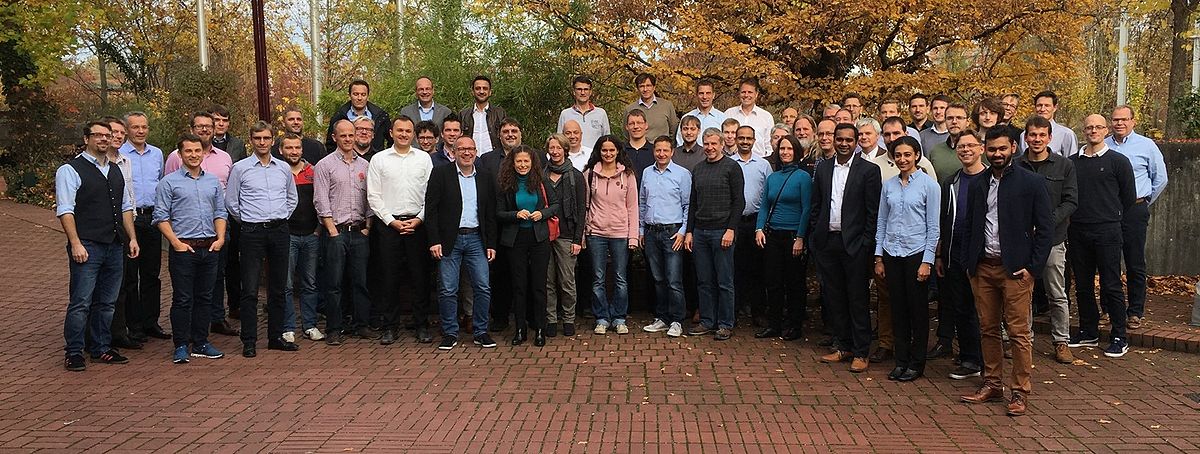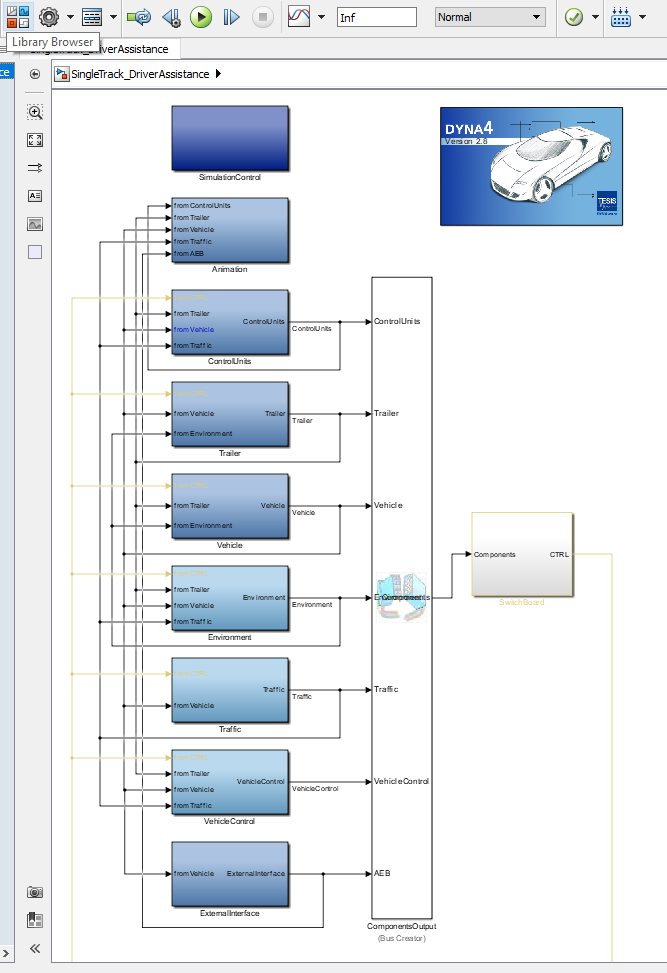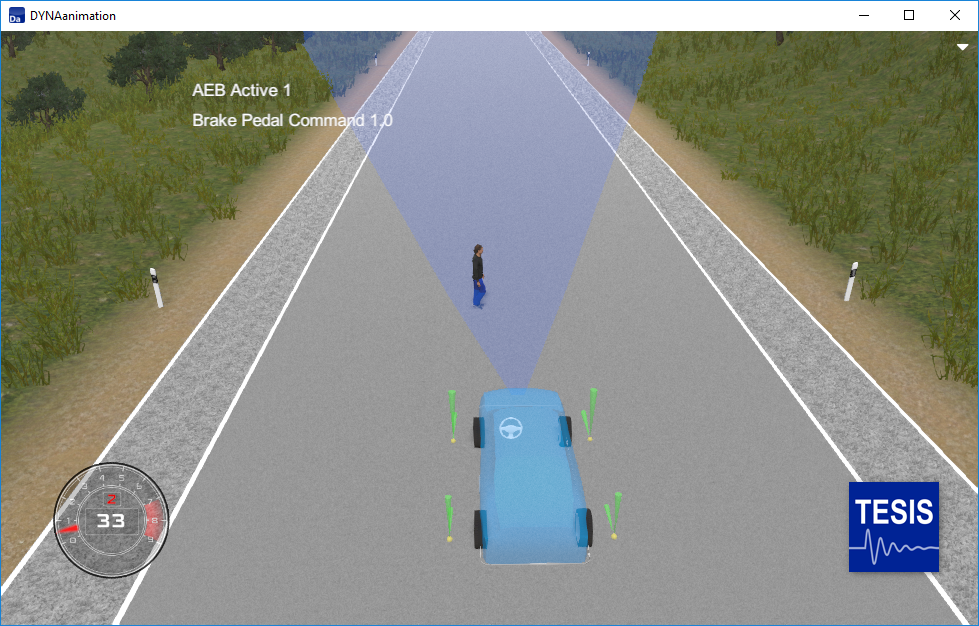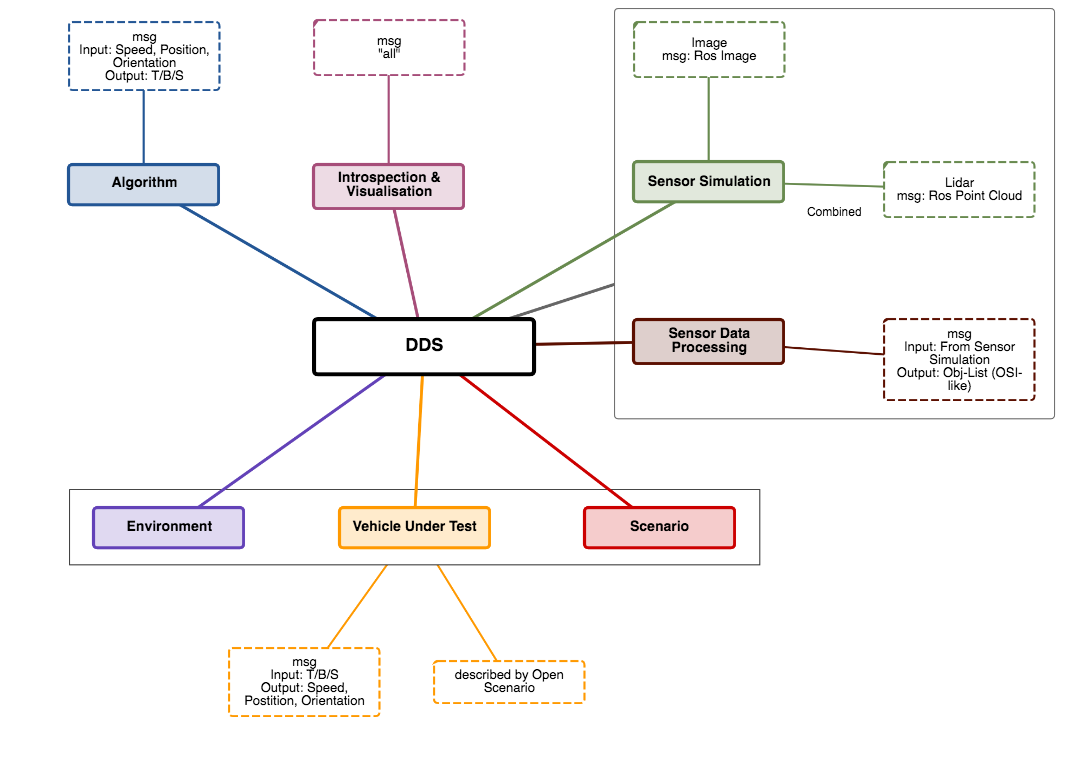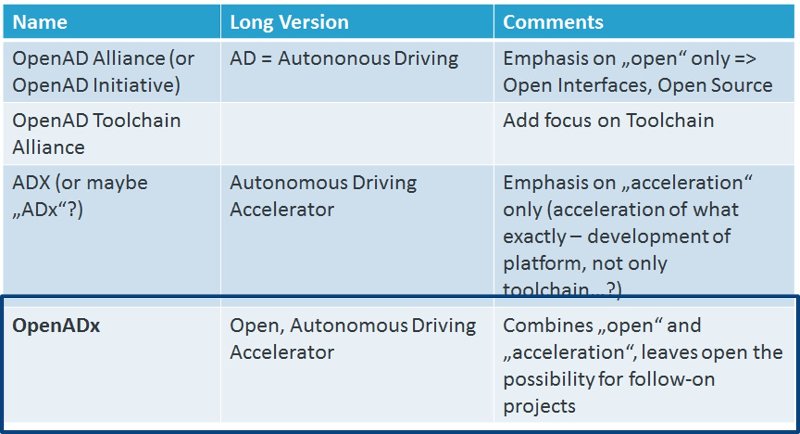Notice: this Wiki will be going read only early in 2024 and edits will no longer be possible. Please see: https://gitlab.eclipse.org/eclipsefdn/helpdesk/-/wikis/Wiki-shutdown-plan for the plan.
OpenADx/EventsArchive
Contents
- 1 Events
- 1.1 EclipseCon 2020 - Community Day - October, 19th 2020 - virtual event
- 1.2 OpenADx Workshop - Forming an Eclipse Working Group - June, 25th 2019 (Filderhalle, Leinfelden-Echterdingen, Germany)
- 1.3 Workshop 4 (Overall Meeting), November, 6th 2018 (Stuttgart, Germany)
- 1.4 Follow-up Workshop Testbed 1 (Simulation), May, 23rd 2018 (Stuttgart, Germany) - Results
- 1.5 Bosch Connected World, Feb. 21st and 22nd, 2018 (Berlin, Germany) - Results
- 1.6 Workshop Testbed 1, Jan. 31st, 2018 (Waiblingen, Germany) - Results
- 1.7 Workshop 3, Oct. 23rd, 2017 (Ludwigsburg, Germany) - Results
- 1.8 Workshop 2, Sept. 19, 2017 (Stuttgart, Germany) - Results
- 1.9 Workshop 1, Aug. 2, 2017 (Redmond, US) - Results
Events
EclipseCon 2020 - Community Day - October, 19th 2020 - virtual event
Find out more about the EclipseCon and have a look to the session recordings
Find here the presentation material from the "Automotive@Eclipse" Community Day
Presentation list - Automotive@Eclipse Community Day
| Meet the Automotive@Eclipse Community |
| Agenda |
| openMobility and SUMO |
| openPASS |
| openMDM |
| OpenADx |
| Eclipse Mosaic |
| Panorama |
| Eclipse Kuksa – Kuksa demonstrator |
| OpenADx demonstrator |
| Automotive@Eclipse: News and strategy |
| The future of Automotive@Eclipse |
OpenADx Workshop - Forming an Eclipse Working Group - June, 25th 2019 (Filderhalle, Leinfelden-Echterdingen, Germany)
As we presented at the OpenADx Workshop #4 in Leinfelden-Echterdingen on 6 November 2018, we would like to become an Eclipse Working Group. We are happy to invite you to our first meeting about forming the Eclipse OpenADx Working Group.
Several companies have already agreed to help form the OpenADx WG, such as Renesas, itemis, Red Hat, Tesis, Microsoft, IBM, and Bosch.
This event will bring all interested parties together for information about the Eclipse Working Group idea.
Everyone is invited!
We will also discuss technical aspects and continue our open exchange.
Participant lists and contributions will be published on the wiki.
Please let us know who will be founding member and sign the participation agreement. (Link to Working Group Participation Agreement)
The meeting is organized by the Eclipse Foundation and Bosch as an Eclipse member, and will be held under the Eclipse Foundation Bylaws (Eclipse Bylaws, Industry Working Group Process, Eclipse Intellectual Property Policy, Eclipse Anti-Trust Policy).
For questions about the event, please contact Andy Riexinger, Angelika Wittek, or Ralph Müller.
Agenda
09:00 Registration
09:45 Welcome
10:00 Introduction to Eclipse Foundation - Why do we want to become an Eclipse Working Group?
10:30 Presentation and interpretation of OpenADx Charter Proposal
11:00 Coffee and networking break
11:30 Two phases to form the working group - Phase 1
Incubation period (One year, starts after community review. See also Working Group Process.)
- Open charter
- Preparation of working group collaboration and charter
- Initiation of first work package(s)
- Process creation
- Work package proposals
- Working group funding
- Steering Committee and decision-making
12:15 Two phases to form the working group - Phase 2
- Final charter for working group work
- Established work packages
- Defined processes
- Funding
12:30 Lunch
13:30 Steering Committee
(Steering Committee participation is only possible with a signed participation agreement.)
- Election of the members: please think about what role you will fill, and who will be the chair
- Define regular meetings and recurring appointments
- Define meeting minutes publishing
15:30 Coffee and networking break
16:00 Status of OpenADx projects
16:30 Next steps for OpenADx
17:00 End of OpenADx Working Group Forming Meeting
Please register here for the event!
Find here information about the location Filderhalle and directions.
Presentations
Overall Presentation during the Event
Workshop 4 (Overall Meeting), November, 6th 2018 (Stuttgart, Germany)
Blog Post
Participating companies
- 3DS / Dassault Systemes
- AUDI
- AVL
- Bosch
- Continental
- Digitalwerk
- Eclipse Foundation
- ETAS
- Fraunhofer IOSB
- Hella Aglaia
- IBM
- IPG Automotive
- itemis
- Linaro
- Mathworks
- Microsoft
- nttdata
- Prostep
- Red Hat
- Renesas
- Siemens Industry Software
- Silexica
- Streetscooter
- Tesis
- TU Lübeck
- University of Oulu
- Valeo
- Vector
- ZF Friedrichshafen
Group Picture
Presentations
| Presentation list - OpenADx Workshop #4 | |||
|---|---|---|---|
| Introduction to OpenADx | Bosch | Charles Degutis, Lars, Geyer-Blaumeiser, Andreas Riexinger | File:181106 - OpenADx Workshop 4 - Agenda and Presentation.zip |
| Open Source Hardware – Simulation with Virtual Hardware | TU Braunschweig / University Lübeck | Jan Haase | File:OpenADxWorkshop Haase 061118.pdf |
| Software in the loop (SiL) – SiL Framework | Bosch | Thomas Huber | File:Open ADX 061118 SIL standardization.pdf |
| ROS2 Tooling for (automotive) Middleware | Bosch | Johannes Jeising | Sorry! Presentation not released for external. |
| Cloe - Closed Loop Automated Driving Simulation Environment | Bosch | Thomas Grosser | File:181106 - OpenADx Workshop 4 - Cloe.zip |
| OpenADx "Autonomous Driving Simulation" | Renesas | Mark Walton | File:181106 - OpenADx - Renesas.pdf |
| Cross Domain Tool Coupling in the area of Simulation – Use Case @ Bosch | Bosch | Martin Johannaber, Uwe Wilbrand | Sorry! Presentation not released for external. |
| AD and Collaboration for Labeling | Microsoft | Markus Loosen | File:Standards for Labeling - Proposal external.pdf |
| Co Simulation - Challenges in the continous vehicle development process | AVL | Guenter Lang | Sorry! Presentation not released for external. |
| Kubernetes and Serverless Technologies for high-performance Applications | Red Hat | Michael Hausenblas | Kubernetes and Serverless Technologies for high-performance Applications |
| Title will follow (abstract: aspects of operating tool pipelines as a company) | Digitalwerk | Tobias Schmid | File:OpenADX-ADTF.pdf |
Proposed Projects / Project Book
File:181214 - OpenADx - Project Book.pdf
Follow-up Workshop Testbed 1 (Simulation), May, 23rd 2018 (Stuttgart, Germany) - Results
Participating Companies
- AVL
- Bosch
- Elektrobit
- MathWorks
- Microsoft
- Renesas
- TESISdynaware
- TNG
Results
Goal of the workshop was a first demonstrator combining tools of the participating members. We achieved a first demonstrator, that connected the tools. Some screenshots below:
RVIZ in use:
Dyna4 in use:
Bosch Connected World, Feb. 21st and 22nd, 2018 (Berlin, Germany) - Results
We conducted the Autonomous Driving Hackathon on the Bosch Connected Experience. It was a great success, roughly 70 people were working on autonomous driving topics using technologies from Microsoft, Mathworks, German Aerospace Center (DLR), the Dart Racing Team, the European research project Appstacle and Bosch. In the conference we had an interesting keynote from Mr. Hoheisel, a Bosch Board member who announced officially Bosch's participation in the OpenADx initiative. OpenADx was also promoted on the booth of the Eclipse Foundation, were we had lots of inspiring conversations.
Get some impressions on the Bosch Connected World here:
- https://www.youtube.com/watch?v=noOPsat2DWE&list=PL9Hl-EX9h_nUkrZN9ls2A40iNjKFFsQkY
- https://www.youtube.com/watch?v=2p6Ia8ISJNQ
Also be aware of the blog posts that were created in the context of the Bosch Connected World about OpenADx:
- Blog Post: Autonomous Driving Toolchain
- Blog Post: Autonomous Driving Accelerator OpenADx launched
- Blog Post: 5 things you should know about OpenADx
Workshop Testbed 1, Jan. 31st, 2018 (Waiblingen, Germany) - Results
Agenda
- 9:30 Introduction
- 9:45 Presentation and discussion of general architecture (DDS, ROS2)
- 10:00 Presentation from each party about brought tools, data, expertise (10-15 minutes)
- 12:00 Brainstorming Use Cases in small groups
- 12:15 Lunch
- 13:15 Presentation of Use Cases and prioritization to identify demonstrators
- 14:00 Separation into groups per use case to detail demonstrator implementation planning
- 15:45 Presentation of work group results
- 16:00 Conclusions and next steps
- 16:30 End of workshop
Participants
- Johannes Jeising, Bosch
- Paul Bell, Renesas Uk
- Terry Howe, Renesas Uk
- Steffen Lange, AVL
- Josko Balic, AVL
- Tobias Düser, AVL
- Jonas Rübsam, AVL
- Jörg Teßmer, Bosch
- Arndt-Michael Meyer, ETAS
- Andreas Holzner, TNG
- Robert Lock, Bosch
- Stephan Steinfurt, TNG
- Jürgen Ludwig, Elektrobit
- Rolf Jung, HS Kempten
- Daniel Schneider, HS Kempten
- Arun Sojan, University of Oulu
- Robert Gorbahn, Microsoft Dtl. GmbH
- Pasi Kuvaja, University of Oulu, M3S
- Michael Langhammer, Itemis AG
- Andreas Riexinger, Bosch
- Eliane Fourgeau, Dassault Systèmes
- Guillaume Belloncle, Dassault Systèmes
- Franck Corbier, Dassault Systèmes
- Frederic Chucholowski, TESIS DYNAware GmbH
- Maximilian Chucholowski, TESIS DYNAware GmbH
- Tomas Tichy, MathWorks
- Diego Barral, MathWorks
- Lars Geyer-Blaumeiser, Bosch
OpenADx - Simulation Testbed
Idea
For the function of an emergency breaking assist all voluntary parties provide parts for an integrated solution. In a first step this means, that all tools can talk to each other. Therefore there are defined messages for the exchange. It seems reasonable to use DDS as transport layer for it provides desired functionalities and most tools have the possibility to integrate it.
Areas of Activities
- Sensor Simulation
- Video
- Lidar
- Sensor Data Processing
- Video
- Lidar
- Algorithm (Function under Test)
- Vehicle under Test
- Scenario
- Environment
- Introspection & Visualization
Overview Diagram
Addition Information:
- This picture contains an initial draft for the message exchange
- OSI-like means: There is only the structure of the message reused but Google protobuf is not included
- Usage of Point Cloud message
- Potentially use Laser Scan message
- T/B/S: Throttle, Brake and Steering Angle
Active Parties
- Sensor Simulation
- Video: Microsoft, TESIS, Mathworks
- Lidar: TESIS
- Sensor Data Processing
- Video: Renesas
- Lidar: University of Oulu
- Sensor Simulation & Sensor Data Processing - Combined: TESIS
- Algorithm: University of Oulu, Elektrobit, Mathworks, Dassault Systèmes, Bosch
- Vehicle under Test: Dassault Systèmes, Simulink, AVL
- Scenario & Environment - Combined: TESIS
- Introspection & Visualisation: AVL, Bosch (Ros2)
Next Steps
- Prepare .msg files and idl files for the different msgs
- Each interested party is capable to send and receive the mentioned msgs via DDS
- Each interested party provides a minimal implementation of its area to demonstrate the use case
- In the hackathon we integrate the different tools into one solution
On Top
It is clear that data exchange is not enough. It is possible to think of next steps like:
- Common Simulation Time (Stop on debug breakpoint, etc.)
- ...
Workshop 3, Oct. 23rd, 2017 (Ludwigsburg, Germany) - Results
The workshop took place on the Unconference day of Eclipse Con Europe 2017.
Agenda:
- 08:30 - 09:00: Welcome Coffee and Registration
- 09:00 - 12:30: Automotive Unconference including an introduction of OpenADx
- 12:30 - 14:00: Lunch and Poster Session
- 14:00 - 17:30: Working sessions on OpenADx testbed candidates
- 17:30 - 18:30: Meet & Greet
Sessions for testbed candidates:
Testbed candidate 1 (simulation), Moderator: Lars Geyer-Blaumeiser (Bosch)
Participants:
- Lars Geyer-Blaumeiser, Bosch Software Innovations
- Thomas Titze, Microsoft
- Maximilian Chucholowski, TESIS DYNAware GmbH
- Diego Barral, MathWorks
- Joachim Stroop, dSpace
- Boutheina Bannour, CEA
- Michael Langhammer, ITEMIS
- Adam Fuhl, Bosch
- Stefan Griesche, Bosch
- Johannes Jeising, Bosch
- Gerald Stieglbauer, AVL
- Andreas Holzner, TNG
- Andreas Graf, ITEMIS
- Loic Cantat, SYSTEMX
- Christof Hammel, Bosch
Identified and classfied technologies:
- Category Simulation Input:
- Open Drive
- Open CRG
- Open Scenario
- Oddlot
- Pegasus
- Matlab
- Diversity Testcase Generator
- Enable S3
- Category Simulation:
- Matlab/Simulink
- VTD
- OpenPass
- DYNA4
- CarMaker
- Gazebo
- Sumo
- AirSim
- Dymola (Modelica)
- Category Data Evaluation:
- Matlab
- Diversity Test Verdict Computation (Log Analysis)
- ROS
- Category Visualization:
- DYNA4 / Unity
- AirSim / Unreal
- ROS/Rviz
- Category Simulation Framework:
- Test Management Tools
- FMU
- Open Simulation Interface
- DDS
- ROS
- Franca IDL
- Arcosar
- Autosar Adaptive
Possible Use Cases for Testbed Simulation:
- Open loop simulation with recorded sensor data, DuT: Perception
- Closed loop simulation without artificial sensor data, DuT: Planning
- Closed look simulation with artificial sensor data, DuT: Whole Car/System
Decision: First use case is closed loop simulation without artificial sensor data
Focus Technologies for Testbed Simulation:
- Simulation Input: Open Drive, Open Scenario
- Simulation: DYNA4, Matlab/Simulink, AirSim, Gazebo
- Simulation Evaluation: Matlab
- Visualization: AirSim, DYNA4, Rviz
- Simulation Framework: DDS, ROS
Technology selection is furthermore based on participation of interested parties
Known contact persons:
- DYNA4: TESIS, Maximilian Chucholowski
- AirSim: Microsoft, Thomas Titze
- Matlab/Simulink: MathWorks, Diego Barral
- ROS: Bosch, Johannes Jeising
Open Issues:
- Open Drive/Open Scenario: Potential Contact Orga Automotive Simulation Center Stuttgart of Univ. Stuttgart, they provide Oddlot as editor for scenarios, idea is to use contacts, e.g., from OpenPass to get in touch
- Gazebo: Open Robotics, if they are interested
- DDS: DDS is only specification, concrete implementation is needed. All used tools need to have a DDS connection to ensure data transport from tool to tool. DDS should be ROS compatible for the Testbed, Potential DDS Contact Orgas: PrismTech, Eprosima
Potential constraints for the simulation:
- Multiple scenario simulation in parallel
- One simulation time throughout all simulation tools
Next steps:
- The first HackFest is planned for the first two weeks in December. Prior to that an architecture workshop will take place most likely as phone conference mid of November.
- As a preparation, the testbed idea above has to be made more precise, for that one or two preparation calls will be scheduled.
- We will ask for concrete commitments for HackFest participation, the concrete testbed content is of course driven by the participating organisations.
Testbed candidate 2 (massive data ingest), Moderator: Thomas Reinhardt (Bosch)
The idea:
The core vision for this testbed candidate, is to close the gap between 'data generation' optimized infrastructure, i.e. measurement electronics, and state-of-the-art 'data analytic' frameworks. This gap is ever so present in the struggle with heterogeneous data formats and the use case specific tool suites that come along. A global, query-able index that offers a (integrated) analytic engine has yet not been established.
To close this gap, this testbed suggests the implementation of ETL (Extraction, Transformation and Lad) processes that ingests a complete raw measurement data set into an data analytic data structure and perform evaluations / processes. In other words, use well established "Big Data" driven analytic methods to enrich, get better insight and easy access.
The scope:
To narrow down the scope of this testbed, only a development data pipeline should be in focus. This pipeline outputs extreme amounts of raw and processed data, with a limited size of (fleet) vehicles. The testbed implements a suitable ETL to ingest major data formats into a unified view (i.e. into a suitable data structure). A set of simple queries allows to access this transformed data, independent from its original format. As a second step, the testbed implements a data enrichment by demonstrating an easy "plug-and-play" of existing open source components, e.g. by using a neuronal network to create new labels. This newly created (or enriched) information is then feed back into the unified view. As a stretch goal, the testbed implements a connection to feed back this information into existing (automotive) development tools. For example, the testbed offers a playback of queried and enriched data using an Rviz visualization.
The challenge:
- High complexity of measurement data. AD data consists of 1D, 2D and 3D time series with a high velocity. Rates can be as high as up to 3GB/s
- Source of usable data.
Open Questions
- All about the data? A to some extent complex and open source-able raw data set is required.
- Is it possible to record a new data set for the testbed?
- Clear an internal data set of a testbed partner?
- Use data from an autonomous racing team?
Next Steps
More Marketing
Invitation for more participants.
Follow-Up Call
Follow up Skype call on Monday, November 6th at 2pm CEST. Meeting will be provided by Microsoft (to be added here). Invitation also via OpenADx mailing list.
Follow-Up Architecture Workshop (OpenADx Workshop #4)
Architecture Workshop to refine testbed idea. In preparation for the upcoming hackfest:
- Data sets for 'base line'.
- Definition of concrete interfacing tools, formats, requirements, ...
- Definition of a common architecture for a Data Ingest testbed.
- Coordination of hackfest details
Workshop 2, Sept. 19, 2017 (Stuttgart, Germany) - Results
Strategy discussion results
Partners
- Certification organizations
- Universities
- Research institutes
- Standardization organizations like AUTOSAR can provide areas to watch out for
- These are in addition to already identified OEM, tier1, hi-tech, tool providers, silicon chip
Communication
- Need slide deck with a narrative to socialize inside of respective organizations
- Set up a public community under Eclipse management for contribution and preparation work prior to next workshop 23 October
- Weekly telecom to disseminate information – attendance voluntary based on availability
- Hosted communication at e.g. 3D Experience Forums by e.g. Dassault
Execution and milestones
- Further workshop to detail testbeds/incubators - October eclipsecon Europe
- Testbed/incubator execution (Hackathon/Hackfest) – November 2017
- Group composition for hackathon to be determined based on results of testbed/incubator layout
- Testbed/incubator completed by the end of 2017
- Announcement – venue dependent on testbed/incubator results and feasible timing (forums: CES, BCW, Software in Automobiles, Toulouse, Embedded World, WCX – sponsor is SAE International)
Forms of contribution by community members
- Manpower – e.g. programming capacity
- Monetary investment
- Material support - e.g. a car for demonstration purposes
Testbed/Incubator discussion results
- Simulation (formerly #11) – Workshop 1
- ROS in the loop
2. Driver to Driver communications
- Hybrid human -vs- autonomous driving behavior differenced – very hard problem
- Reference / canonical data set - Data Sharing across companies
- Share crash incident data across companies rapidly to accelerate safety resolution
- Open Scenarios - Common ways of defining scenarios
5. API standardization – common way of calling / creating API’s
6. Management & usage of big data
- Massive data ingest
- There’s major value in driving agreement on how data is stored; can we drive agreement in which sensors are used and the format of the sensor data.
- This could benefit government agency that will test using the data to determine the safety of the vehicles
8. Heterogeneous data formats and data fusion
- Compatibility of measured data
- Visualization of data from different sources (lidar, video, measurements) could be very valuable
Conclusion:
- It was agreed that we should concentrate on the top ranked topics #4, #6, #8.
- Proposed procedure is to set up a frequent call to discuss the topics and identify concrete tasks to be executed in "Hackfests“
- On the Unconference of the EclipseCon Europe on Oct. 23rd, the topics should be discussed further. Ideal result is to have them prepared for a "Hackfest".
- General agreement for participation in the concretization of the topics by XXXXXXX and XXXXX employees.
Workshop 1, Aug. 2, 2017 (Redmond, US) - Results
1. Gain points and pain points to address
Opportunities / gains
- Manage complexity / risk
- Reallocate portions of resource pool to more user relevant activities
- Commonality reduces risk
- Reduce cost in a non-automobile implementation area; the tool chain is outside of the vehicle
- AD development accelerator consists of known and certified components and services => ensure
Risks / pains
- What if this group of companies come together but is not actually able to complete the project
- Will this be fast enough to satisfy TTM needs of the OEMs
- How will sufficient safety levels be reached and assured
- Preserve independence: This initiative might actually preserve the second source needs OEM and Tier1 somewhat fearful of IT industry
2. Value proposition
- Reduced investment risk and cost reduction through shared development
- Improved capability to focus resources in more saleable areas
- Improved SW reliability and safety
- Standardization facilitates greater AD understanding and therefore greater acceptance in the political, legal and insurance communities
- Standardization promotes interchangeability @ OEM
3. Key success factors
=> Build momentum for the initiative
- Demonstrate that we can deliver; lofty vision is OK, but initial projects must be
=> Realistic / achievable
=> Clearly scoped
=> Measurable
- Start with a “coalition of the willing”
=> Not everyone will want to participate initially; reduce skepticism with results
- A common data pool to accelerate development
- Limit scope to non-differentiating factors
- Open APIs, Open framework and open collaboration => industry standard
=> Mix of multiple partners in each area… ”coopetition”
- Extensibility within the system to add modules without the OEM being required to open up all data access – that must remain a choice@OEM
Potential naming options

